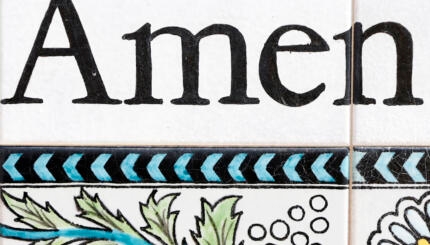The siddur was always intended to be the most popular Jewish book. As such, editors have had a variety of competing interests. On the one hand, if a siddur was the only book that a Jew might own, it should certainly have everything one might need for prayers in a synagogue. At the same time, if most Jews were going to own a siddur, putting in other important and valuable information was a significant draw. When printing became much less expensive, people began to cut these “extras” out of the siddur, because people had other books and they might prefer a smaller, more compact siddur.
One common addition is the first of the seven aliyot (sub-sections of the weekly Torah portion; literally “ascents”) for each Torah portion of the year. These first aliyot are each divided into three smaller sections for reading on Mondays, Thursdays, and Shabbat afternoons. Another common addition is Maimonides’ Thirteen Articles of Faith.
Many siddurim include sections intended for home use, such as blessings and rituals for a family to celebrate Shabbat evening in their home. Beginning with blessings for lighting the Shabbat and festival candles, there are also the blessings that comprise the Kiddush, or sanctification over a cup of wine before the meal, as well as the blessing of bread. Some include Birkat HaMazon, the grace after meals, along with Shabbat zemirot, or songs to be sung at the table to celebrate the day.
Serving as a textbook of popular piety, many siddurim also have various berakhot (blessings) that one can say before eating different kinds of food, or to sanctify common moments in one’s life, such as seeing a rainbow, hearing thunder, or smelling fragrant trees and shrubs. Some siddurim also include a slim volume of the Mishnah, called Pirkei Avot, or Ethics of the Fathers, which is a compilation of the various ethical and moral sayings of the talmudic rabbis, as well as Psalms 120 to 134, all of which begin “A Song of Ascent” and were recited in ancient times by pilgrims traveling to Jerusalem. These selections are included to provide an opportunity for common Jews to study rabbinic texts and to add to the sanctity of their enjoyment of the Shabbat and festivals.
Over the centuries, poets and rabbis created new religious poems (called piyyutim) to be recited at various points in the Shabbat and holiday services; many of them appear in siddurim today. Three particular piyyutim grace the pilgrimage festivals. On Shemini Atzeret, at the conclusion of Sukkot in the fall and the beginning of the rainy season in the Middle East, the cantor recites a poem called Geshem (literally “rain”) entreating God to send the seasonal rains if not on our account, then for the merit of our biblical ancestors. At the end of the rainy season on Passover, another poem asks God to continue blessing the crops by sending dew instead of the rain.
With your help, My Jewish Learning can provide endless opportunities for learning, connection and discovery.
A similarly lengthy piyyut provides a detailed historical introduction to the reading of the Torah on Shavuot. Akdamut, written in Aramaic, serves as a poetic preamble to the revelation of the Torah (and falls into the category of reshut, a piyyut of “permission” that is placed before an important liturgical act, in this case the recitation of the Ten Commandments). It describes the heavenly events that accompanied the creation of the world, all seen as mere prelude to God’s giving of the Torah to the Israelites.
Originally, these poems as well as other liturgical poems and special readings for the festivals were included in machzorim (special holiday prayer books). As communities decreased the numbers of additional poems that were recited, machzorim became common primarily for the High Holidays, and these few poems were taken into the siddur, though machzorim for all the festivals continue to be published and used by some Jews.
Shabbat
Pronounced: shuh-BAHT or shah-BAHT, Origin: Hebrew, the Sabbath, from sundown Friday to sundown Saturday.
siddur
Pronounced: SIDD-ur or seeDORE, Origin: Hebrew, prayerbook.
Sukkot
Pronounced: sue-KOTE, or SOOH-kuss (oo as in book), Origin: Hebrew, a harvest festival in which Jews eat inside temporary huts, falls in the Jewish month of Tishrei, which usually coincides with September or October.
Torah
Pronunced: TORE-uh, Origin: Hebrew, the Five Books of Moses.


